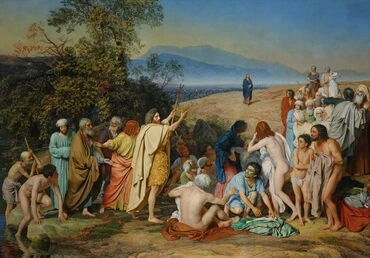Explanation of John 1:15
Av Brian David

When Jesus was being tested in the wilderness, He quoted Scripture to push away temptation. When He rode a donkey’s colt into Jerusalem, He did it to fulfill prophecy. When He offered the Two Great Commandments, he said that on them "hang all the Law and the Prophets." And in Luke 24, after His death and rising, he appeared to the disciples and "expounded unto them in all the scriptures the things concerning himself." He did not cast aside the Word as it then existed, to be replaced by the new things He was teaching. He opened it up to show the true meaning inside – a meaning in full accord with the things He was teaching.
That is illustrated in this verse. John the Baptist represents the external, literal meaning of the Old Testament; to "witness" means to confirm that something is good by looking at things we know to be true. And the Old Testament did confirm Jesus as the Lord! In fact, the Writings tell us that at its deepest level the Old Testament is entirely an unveiling of the Lord’s loving nature, which puts "this was He of whom I spake" in a brilliant and beautiful light. The Word had been telling people about the Lord all along, if only they had understood.
The statement that Jesus came "before" John seems odd. We know that John was about six months older, and that he was preaching before Jesus; how was Jesus "before" him? The answer is that Jesus was the embodiment of the Lord’s divine truth, the pure expression of the Lord’s love. The Lord’s love is from eternity to eternity, unchanging, and so its expression – divine truth – is also from eternity to eternity, unchanging. Jesus was a new form for that truth, a new way of sharing it with humanity, but His essence had always been and would always be. The Old Testament – represented by John -- was created from that divine truth as a container, so the divine truth certainly came before it.
The Lord #1
1. Teachings for the New Jerusalem on the Lord
The Entire Sacred Scripture Is about the Lord, and the Lord Is the Word
WE read in John,
In the beginning was the Word, and the Word was with God, and the Word was God. He was in the beginning with God. All things were made through him, and nothing that was made came about without him. In him there was life, and that life was the light for humankind. And the light shines in the darkness, but the darkness did not grasp it. And the Word became flesh and lived among us; and we saw his glory, glory like that of the only-begotten child of the Father. He was full of grace and truth. (John 1:1-3, 5, 14)
In the same Gospel,
Light has come into the world, but people loved darkness rather than light, because their deeds were evil. (John 3:19)
And elsewhere in the same Gospel,
While you have the light, believe in the light, so that you may become children of the light. I have come into the world as a light so that anyone who believes in me will not remain in darkness. (John 12:36, 46)
We can see from this that the Lord is God from eternity and that he himself is that Lord who was born into the world. It actually says that the Word was with God and that the Word was God, as well as that nothing that was made came about without him, and then that the Word became flesh and that they saw him.
There is little understanding in the church of what it means to call the Lord “the Word.” He is called the Word because the Word means divine truth or divine wisdom and the Lord is divine truth itself or divine wisdom itself. That is why he is also called the light that is said to have come into the world.
Since divine wisdom and divine love are one with each other and have been one in the Lord from eternity, it also says “in him there was life, and that life was the light for humankind.” The life is divine love, and the light is divine wisdom.
This oneness is what is meant by saying both that “in the beginning the Word was with God” and that “the Word was God.” “With God” is in God, since wisdom is in love and love is in wisdom. This is like the statement elsewhere in John, “Glorify me, Father, together with yourself, with the glory I had with you before the world existed” (John 17:5). “With yourself” is “in yourself.” This is why it adds “and the Word was God.” It says elsewhere that the Lord is in the Father and the Father is in him [John 14:10], and that the Father and he are one [John 10:30].
Since the Word is the divine wisdom of the divine love, it follows that it is Jehovah himself and therefore the Lord, the one by whom all things were made that were made, since everything was created out of divine love by means of divine wisdom.






